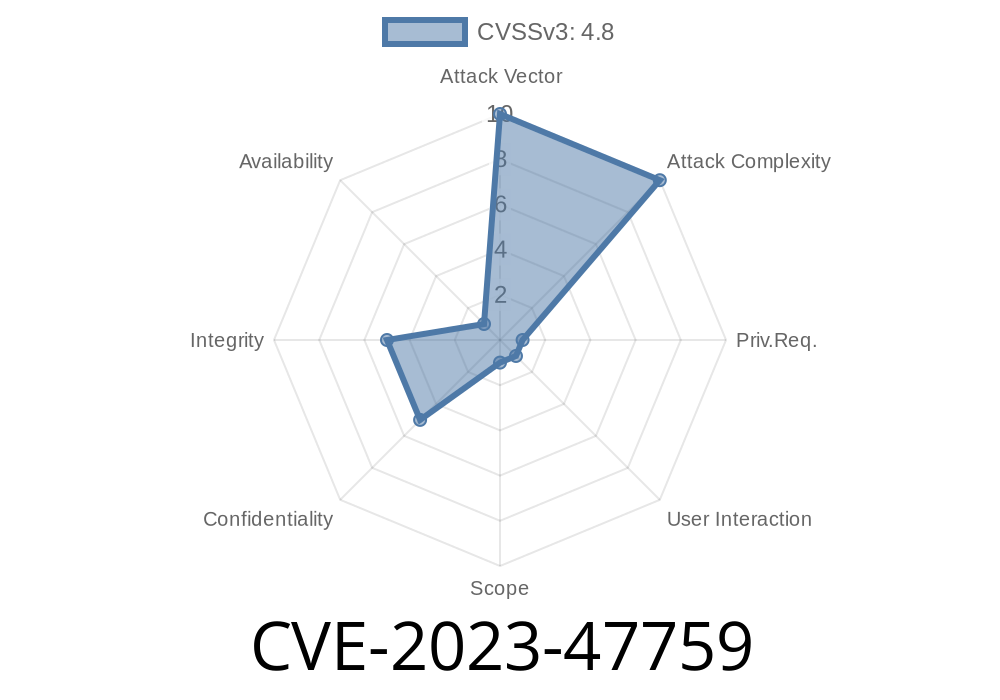WordPress is a widely used content management system (CMS), making its plugins a prime target for attackers. Recently, CVE-2023-47759 revealed a Cross-site Scripting (XSS) flaw in the Premio Chaty plugin, affecting all versions up to and including 3.1.2. This post breaks down the vulnerability, details how an attacker can exploit it, and provides essential steps users can take to secure their websites.
What is CVE-2023-47759?
CVE-2023-47759 refers to an Improper Neutralization of Input During Web Page Generation (Cross-site Scripting) vulnerability in the Premio Chaty plugin (<= 3.1.2). This allows an attacker to inject malicious code (JavaScript) into your website, potentially stealing cookies, sessions, or manipulating the site content for all users.
Where’s the Issue?
Chaty plugin lets site admins embed floating chat widgets for WhatsApp, Messenger, and other platforms. The flaw lies in how user-supplied input is handled and rendered on web pages. The plugin fails to sanitize or escape certain parameters, leading to JavaScript injection.
Affected Parameter
Researchers discovered that the chat_settings or other widget configuration fields were not properly escaped in the admin area or on the frontend, allowing XSS if an attacker manages to get code inserted there.
// Hypothetical vulnerable code sample from Chaty (<=3.1.2)
echo "<div class='chat-widget' data-title='{$_POST['widget_title']}'></div>";
The plugin takes input like widget_title directly from POST data (for instance, when saved by an admin) and echoes it into the page without escaping. If an attacker can control this (via social engineering or lower privileged users), they can inject JavaScript.
Let’s say someone manages to add this to widget_title
" onmouseover="alert('XSS')"
This could result in
<div class='chat-widget' data-title='" onmouseover="alert('XSS')"' ></div>
Now, whenever a user hovers over the widget, an alert would pop up—proving that arbitrary code execution is possible.
How Attackers Exploit This
1. Get Access: Attacker needs access to add chat widgets or modify widget settings, either via admin or tricking a privileged user (CSRF scenario).
Below is a simple PoC. Suppose the attacker can set widget_title to
<img src=x onerror=alert('PremioChatyXSS')>
Anyone viewing the widget will see a JavaScript alert, confirming successful XSS.
The Fix
Premio patched this vulnerability in version 3.1.3. The solution involves properly escaping and sanitizing all inputs rendered in the DOM.
Safe Code Example
$title = esc_attr($_POST['widget_title']);
echo "<div class='chat-widget' data-title='{$title}'></div>";
The function esc_attr() ensures that dangerous characters are encoded and cannot break out of the HTML attribute context.
How to Protect Yourself
1. Update Immediately: Upgrade Chaty to the latest version.
Limit Access: Restrict who can manage plugin settings.
4. Install Security Plugins: Use tools that can flag or block XSS attacks (e.g., Wordfence).
References & Further Reading
- CVE-2023-47759 NVD Entry
- WPScan Vulnerability Database
- Premio Chaty Plugin on WordPress.org
- OWASP XSS Cheat Sheet
In Summary
CVE-2023-47759 is a critical XSS vulnerability in Premio Chaty (<= 3.1.2) for WordPress. If unpatched, it exposes your website and users to code injection threats. The best defense is to update fast, sanitize user inputs, and monitor your site for suspicious activity.
Timeline
Published on: 11/22/2023 20:15:09 UTC
Last modified on: 11/29/2023 02:30:03 UTC
